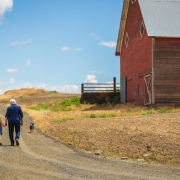Which Child Gets the Farm?
Imagine a pair of aging parents that have been farmers and own their farm. Now, though, they’re getting on in years and they’re considering moving into a smaller place. One of the daughters and her husband help run the farm, but the rest of the siblings have moved away and they aren’t interested in returning. It’s now time to think about how the farm legacy should be worked out.
The first order of business is to plan the finances so the parents can enjoy a comfortable standard of living in their later years. They may need long-term care in the future, so they should consult an elder-law attorney about how to plan most effectively. If they don’t plan, they could lose the farm later to a lien, to reimburse the government if they end up needing Medicaid assistance.
Elder law attorneys can also advise about how to avoid problems if a parent re-marries after the first one passes. There’s no telling what can happen to the family property when one spouse is left lonely and finds someone else. Sometimes the results are terrible for family harmony.
Next, it’s necessary to allocate the value of the farm among all the children, so that each child is accounted for once the parents pass. This is by no means an easy process. For a transition plan to be successful, a great deal of planning, preparation, and communication is needed.
Here, it’s best to do some research. There are a host of useful publications that can guide the exploration. Kansas State University provides a twelve-step analysis of questions to be answered.
Farm Bureau Financial Services offers several detailed guides covering various aspects of the planning process.
The Beginning Farmers website is loaded with links to farm-succession courses, blogs, toolkits, farm management advice, and cooperative extension assistance in various states.
For real-life success stories, consult the Successful Farming website, here
and here
https://www.agriculture.com/farm-management/estate-planning/tips-on-designing-a-farm-succession-plan
When you’re ready to start planning for your farm and other valuable property, we’ll be ready to help. Please contact our Ruston, LA office by calling us at (318) 255-1760 or schedule an appointment to discuss how we can help with your long-term care needs.


